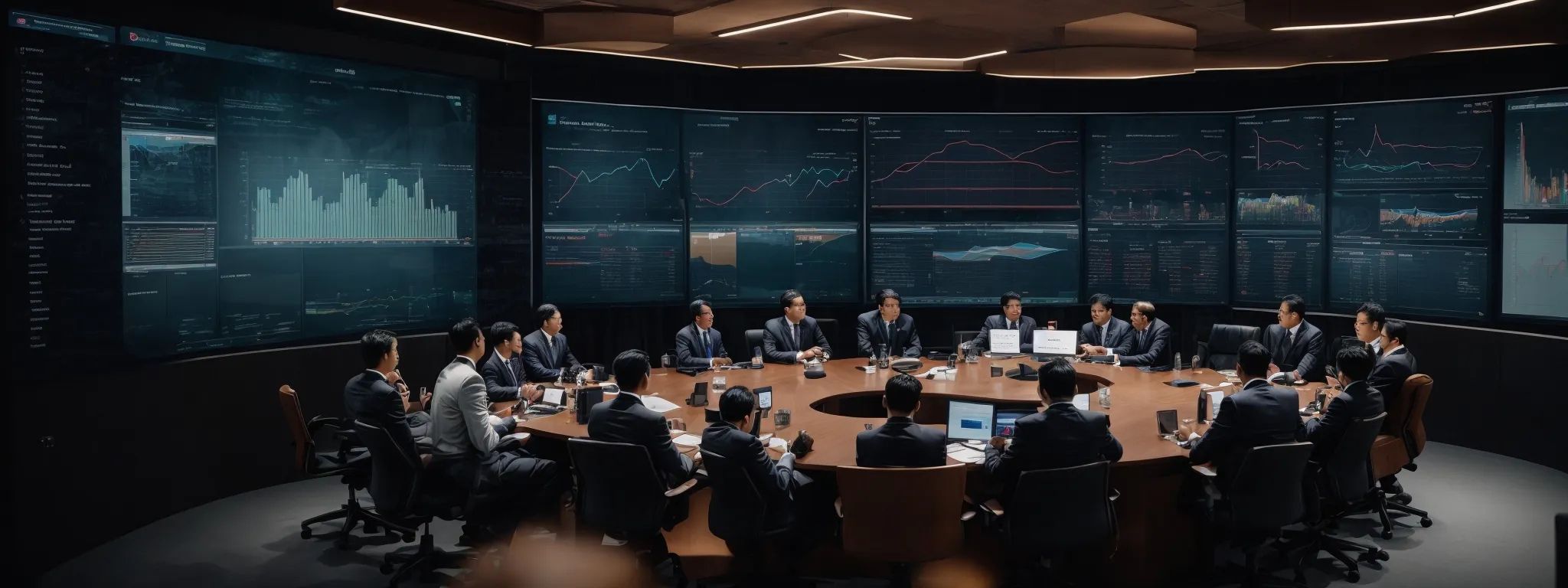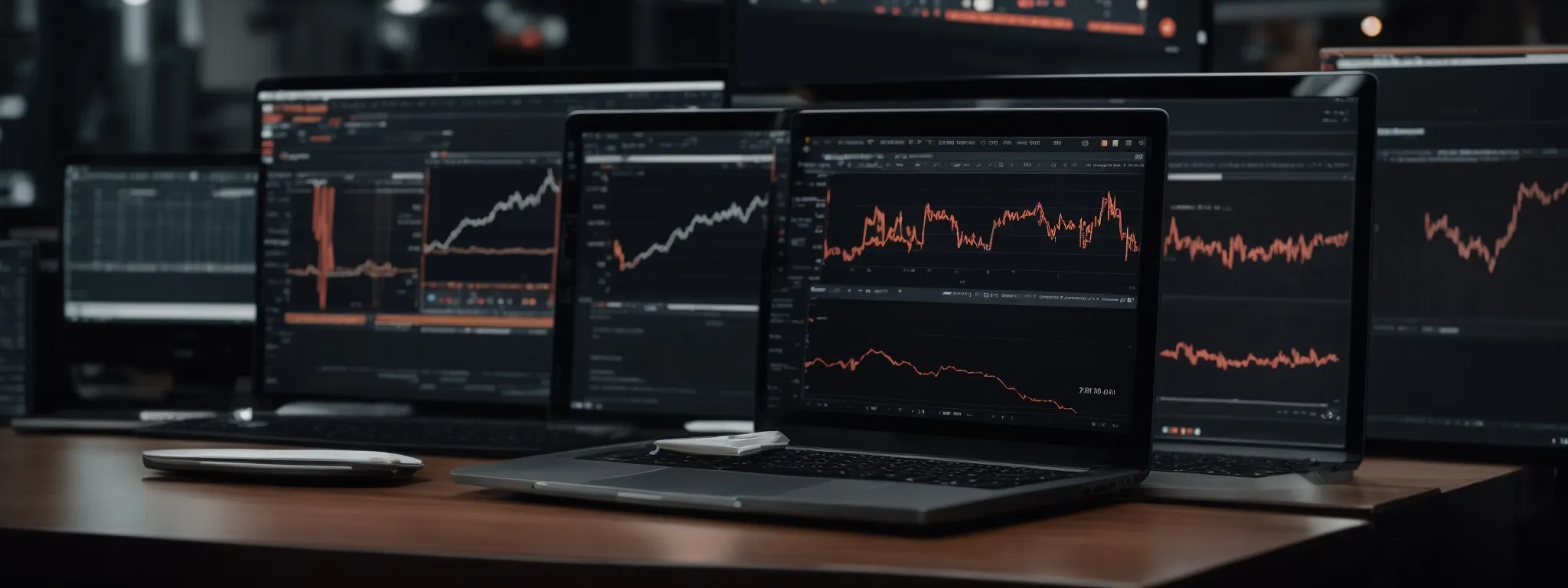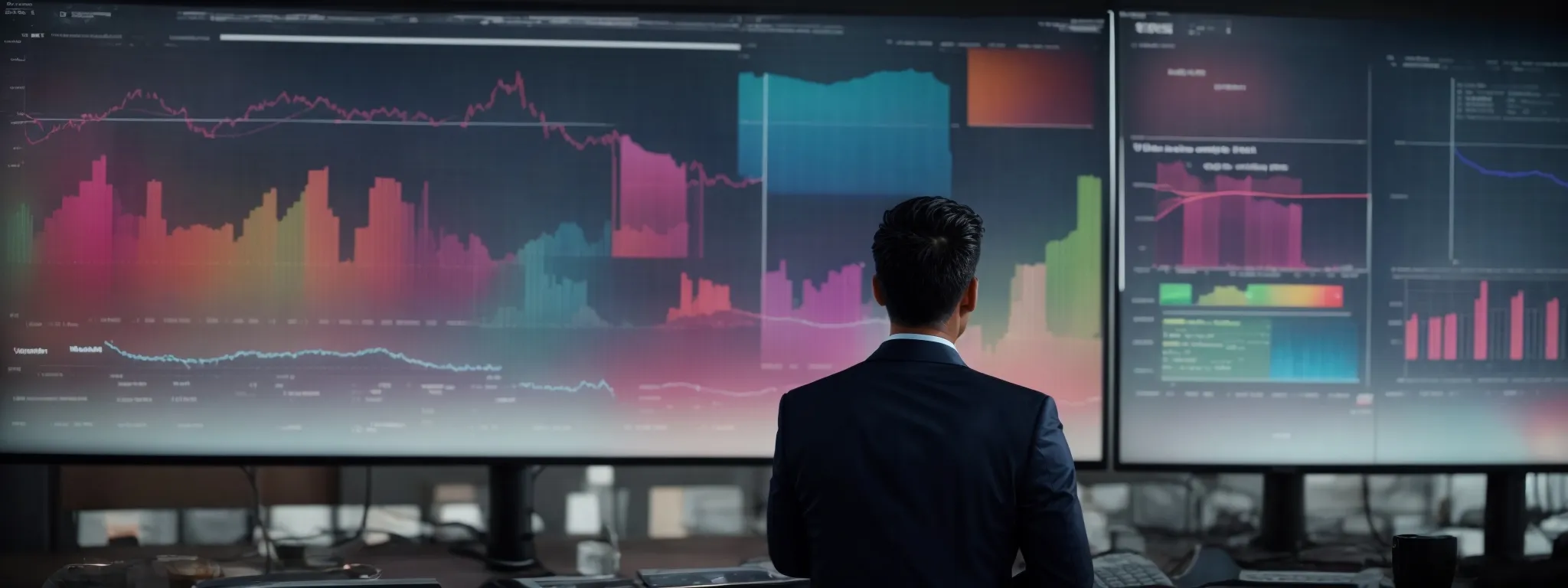Industrial Products and Digital Marketing
Maximizing Sales With Effective Digital Marketing Strategies for Industrial Products In the fiercely competitive arena of industrial products, understanding the nuances of digital marketing can be the […]
Maximizing Sales With Effective Digital Marketing Strategies for Industrial Products
In the fiercely competitive arena of industrial products, understanding the nuances of digital marketing can be the linchpin in escalating sales and building brand recognition.
Success hinges on zeroing in on your target market and presenting a value proposition that resonates with the needs and challenges of these potential clients.
A blend of finely-tuned search engine optimization, poignant social media presence, and robust content marketing is pivotal in capturing the attention of B2B buyers.
Determining the most effective channels and tactics for your specific niche requires not only expertise but also sophisticated tools tailored for digital success.
Keep reading to uncover the pivotal strategies that will transform your digital marketing efforts and drive measurable results for your industrial products.
Key Takeaways
- Industrial Companies Must Tailor Their Digital Marketing to the Complex Buyer Journeys of Their B2B Audience
- Leveraging Tools Like LinkGraph and SearchAtlas by LinkGraph Can Optimize Content for Better SEO Performance and Targeted Customer Reach
- Creating Segmented Messaging for Diverse Market Segments Increases the Effectiveness of a Marketing Campaign
- Video Marketing and Customer Testimonials Serve as Powerful Tools for Building Trust and Simplifying Complex Industrial Offerings
- Regularly Analyzing Digital Marketing Metrics With Tools Like SearchAtlas SEO Software Is Essential for Campaign Optimization and Increasing Sales
Identifying the Ideal Customer for Industrial Products

In the intricate landscape of industrial sales, grasping the contours of one’s customer base stands as a pivotal facet of a robust marketing strategy.
This understanding begins with a thorough analysis of the market to pinpoint the exact demographics that make up the target audience.
It is also essential to dissect the purchasing patterns of industrial buyers, revealing insights that catalyze more informed marketing decisions.
Furthermore, professionals realize the potency mined from existing customer databases, utilizing these potent repositories of information for enhanced market segmentation.
These processes converge to forge a foundation from which digital marketing efforts can be fine-tuned, yielding maximized conversions.
Analyzing the Market to Find Your Target Audience
For industrial companies venturing into the digital domain, pinpointing the ideal customer begins with a meticulous market analysis. This crucial stage involves leveraging SearchAtlas SEO software to discern key trends and search patterns that industrial buyers exhibit in the digital sphere.
Utilizing advanced tools such as LinkGraph’s SEO content assistant, businesses can identify which search terms and product features resonate most with their target market. This data-driven approach enables a manufacturing company to tailor its digital marketing campaign, aligning with the specific needs and interests of its target customers.
Understanding the Purchasing Behavior of Industrial Buyers
Analyzing the purchasing behavior of industrial buyers requires a deep dive into the specifics of B2B transactions — an arena where the sales cycle is notably more complex and drawn out compared to B2C scenarios. Sales teams in industrial marketing focus on nurturing relationships and understanding the unique needs and concerns of each buyer, often involving multiple stakeholders in the decision-making process.
Industrial companies must adapt their digital marketing strategies to address these specific buyer journeys, which tend to emphasize detailed product information, technical specifications, and efficiency gains. By utilizing platforms like LinkGraph and SearchAtlas by LinkGraph, vendors can ensure their online content is accessible precisely when these key decision-makers are seeking solutions, thus positioning themselves advantageously in a competitive marketplace.
Leveraging Existing Customer Data for Better Segmentation
Vendors in the realm of industrial marketing are swiftly acknowledging the imperative of mining their existing data troves. This strategy empowers companies to slice through the general market and discover granular segments, leading to targeted and efficacious marketing campaigns.
Armed with a rigorous blend of historical sales data, client feedback, and interaction metrics, industry experts can construct a bespoke marketing approach calibrated to the needs and behaviors of distinct buyer personas. The employment of this data underscores the potential for companies to incredibly enhance relevance and engagement for each customer group.
Crafting a Strong Value Proposition

In an era where competition is fierce and customer attention spans are fleeting, crafting a strong value proposition is critical for industrial companies seeking to stand out in the digital marketplace.
This necessitates a clear delineation of the unique selling points of their industrial products, which in turn, need to be communicated effectively to resonate with the intended target audience.
By articulating the distinct benefits of their offerings and tailoring their marketing messages to accommodate the slew of different segments in the market, businesses can assure their value proposition cuts through the noise and garners the interest of potential buyers, setting the stage for increased sales and sustained growth.
Defining Unique Selling Points of Your Industrial Product
Establishing the unique selling points of an industrial product is instrumental in distinguishing a brand from its competitors. Through the insights gleaned from SearchAtlas SEO software, suppliers can unveil those attributes of their products that most closely align with industry trends and buyer demands, thereby sharpening their marketing narratives.
Essential to this pursuit is a focused message that conveys the distinct advantages of a product, whether in terms of durability, efficiency, or innovation. By deploying digital PR services and informed PPC Google Ads strategies, industrial companies amplify these selling points effectively, capturing the attention and trust of their intended target market.
Communicating the Benefits Clearly to the Target Audience
Industrial entities thrive when they effectively convey the benefits of their products to clients. Imbuing marketing assets with clarity not only delineates product advantages but also serves to educate and address the specific needs of the target customers. This fosters an environment where the customer perceives the industrial product not as a mere commodity, but as a pivotal solution to their challenges.
LinkGraph digital marketing and SearchAtlas by LinkGraph empower suppliers to articulate their value proposition with precision. These platforms enable the distribution of consistent, benefit-oriented messaging across various marketing channels, ensuring that every campaign, be it a content marketing piece or a tailored PPC Google Ads strategy, reinforces the product’s unique strengths to the potential buyer.
Tailoring the Message for Different Segments in the Market
When engaging different market segments, an industrial company must customize its messaging to connect effectively with each subset of the target audience. The content used to reach a purchasing manager in a manufacturing facility, for example, will differ markedly from that which appeals to a wholesale distributor.
For vendors, the implications of this customization run deep; it requires a keen understanding of each segment’s unique preferences and pain points. By crafting messages that address the distinct concerns and values of each group, a company elevates the likelihood of resonating with key decision-makers and influencing their purchasing decisions.
| Segment | Preferences | Pain Points | Customized Messaging Approach |
|---|---|---|---|
| Purchasing Manager | Cost efficiency, reliability, vendor support | Supply chain complexities, downtime costs | Highlight ROI, quality assurance, and comprehensive post-sales services |
| Wholesale Distributor | Product range, scalability, exclusivity | Inventory management, market competition | Emphasize variety, scalability solutions, and competitive advantage |
Selecting the Right Digital Marketing Channels

Embarking on the quest to invigorate sales for industrial products, vendors recognize the imperative of discerning and engaging the most rewarding digital marketing channels.
This selective approach is not about omnipresence, but about cultivating presences where it counts – in the environments where target audiences actively seek industrial solutions.
As companies evaluate the diverse array of digital platforms, initiating multi-channel marketing strategies becomes an artful balancing act that deftly intertwines various outreach methods.
To optimize each channel, industrial marketers must adeptly configure the nuances of their promotional efforts, ensuring that these channels not only reach but also resonate with potential clients.
The deployment of such refined, multi-pronged tactics paves the way for industrial products to gain prominence and drive sustained revenue growth.
Evaluating the Effectiveness of Various Digital Platforms
Industrial marketers seeking the prime digital real estate for their products face the task of assessing the efficacy of available platforms. They must consider metrics such as user engagement, conversion rates, and ROI to gauge whether channels like social media, specialized industry forums, or email marketing align with their marketing objectives and audience preferences.
It is essential for vendors to employ sophisticated tools like SearchAtlas SEO software, which offers insights and analytics specifically tailored for evaluating digital platforms. This data enables marketers to make informed decisions, honing their strategies to focus on channels that have a proven track record of reaching and influencing their target customers effectively.
Integrating Multi-Channel Marketing Strategies
Integrating multi-channel marketing strategies requires industrial companies to curate a cohesive narrative that permeates every touchpoint with the target audience. By weaving together elements from various marketing channels—be it through LinkGraph digital marketing campaigns, SearchAtlas SEO software-enhanced content, or strategic PPC Google Ads placements—companies ensure a unified brand experience that boosts engagement and drives sales.
Success in these endeavors hinges on an intelligent application of digital PR services and SEO reputation management to maintain a consistent and authoritative brand image across platforms. Meticulous orchestration of content ensures that each channel, from email campaigns to social media marketing, plays a distinct, harmonious role in the broader symphony of the digital marketing strategy.
Optimizing Each Channel for Industrial Product Promotion
In the dynamic realm of industrial products, optimizing each marketing channel is essential to ensure a product’s features are showcased to the right segment of the target market. Vendors utilize tools like the SEO content assistant from LinkGraph and SearchAtlas SEO software to scrutinize and adapt content, creating a specialized approach that appeals to decision-makers within the target audience based on data-driven insights.
Successfully employing PPC Google Ads strategies or email marketing requires a level of finesse; precision targeting and compelling ad copy lead to engagement and conversions. Industrial companies can rely on SearchAtlas by LinkGraph’s platform to streamline these processes, ensuring that their digital marketing campaigns are not only visible but also resonate powerfully with potential clients across various touchpoints.
| Marketing Channel | Optimization Strategy | Expected Outcome |
|---|---|---|
| SEO-Enhanced Content | Leverage LinkGraph’s tools for keyword optimization and content relevance. | Higher SERP positions, increased organic traffic. |
| PPC Google Ads | Employ targeted ad copy and SearchAtlas’s analytics for bid management. | Improved ad performance, cost-effective leads. |
| Email Marketing | Use segmented lists and tailored messaging for different buyer personas. | Higher open rates and engagements, more quality leads. |
Search Engine Optimization for Industrial Websites

For industrial product vendors eager to accelerate their sales trajectory, the pursuit of search engine optimization (SEO) stands as a cornerstone of their digital marketing efforts.
A well-orchestrated SEO strategy ensures that a manufacturer’s virtual storefront—their website—ranks prominently on search engine results pages, capturing the attention of potential buyers at critical moments in the purchasing process.
This strategic initiative involves conducting nuanced keyword research tailored to articulate the technical queries of industrial clients, optimizing the metaphorical blueprints of website structure and the substantive quality of on-page content, and constructing a robust portfolio of industry-specific backlinks.
Collectively, these SEO endeavors leverage the digital landscape to attract quality leads and fortify the online prominence of industrial brands.
Conducting Keyword Research Specific to Industrial Queries
Penetrating the industrial market with precise keyword research is a critical step for vendors looking to optimize their search engine visibility. LinkGraph digital marketing harnesses advanced keyword research tools to uncover the specific terms that potential buyers use when seeking industrial solutions, thereby crafting content that aligns with these search behaviors.
This fine-tuned approach ensures that content developed for a manufacturing company’s website resonates with their target audience’s search intent and technical queries. The deployment of SearchAtlas’s SEO software elevates this process, pinpointing industry-relevant keywords capable of drawing in a more targeted visitor base to the site:
| Marketing Challenge | Keyword Focus | Strategic Benefit |
|---|---|---|
| Achieving visibility in niche industrial markets | Long-tail, industry-specific terms | Increased relevance, improved search rankings |
| Serving decision-makers’ precise information needs | Technical specifications, product applications | Elevated authority, enhanced user experience |
Optimizing Website Structure and Content for SEO
Subsequent to identifying the most impactful keywords, it is critical for industrial vendors to construct a website architecture that caters to both search engines and user experience. This entails organizationally sound site structure and navigation pathways that allow potential customers to traverse the website with ease, ensuring they can find relevant information without frustration.
As part of optimizing web content for SEO, meticulous attention to on-page elements—title tags, meta descriptions, and header tags—is imperative for industrial manufacturers. Crafting these components with precision enables search engines to index content effectively, which in turn heightens the chances of the company’s offerings being discovered by the target market during their search queries.
Building Industry-Specific Backlinks for Higher Rankings
In the strategic landscape of digital marketing for industrial products, acquiring quality backlinks from industry-relevant sources is a game-changer for enhancing the search result performance of a company’s website. This technique involves curating relationships with authoritative sites within the industrial sector, urging these entities to feature links that direct back to the vendor’s content-rich landing pages.
The process of obtaining these valuable industry-specific backlinks is a testament to the strength of a vendor’s digital PR services:
- Identifying key influencers and industry publications that resonate with the target market,
- Engaging in collaborative content opportunities and thought leadership,
- Leveraging white label link building services when necessary to expand reach and credibility.
The accumulation of such backlinks not only bolsters a site’s domain authority but serves as a beacon for search engines, signalling the relevance and quality of the company’s digital footprint.
Utilizing Social Media to Connect With Industrial Audiences

As industrial companies venture into the labyrinth of digital marketing to amplify their sales, the strategic use of social media emerges as an unmissable frontier.
These platforms offer unprecedented opportunities to connect with a tech-savvy industrial audience, foster meaningful conversations, and enhance the visibility of a brand’s offerings.
To leverage these communities effectively, companies must meticulously select social platforms that are known to attract industrial professionals, disseminate content that strikes a chord with this distinctive audience, and engage in dialogue that builds a foundation of trust and brand authority.
This approach not only expands the reach of a company’s marketing message but also aligns with the evolving landscape where digital touchpoints can significantly influence buyer decisions.
Choosing Social Platforms Frequented by Industrial Professionals
In the realm of industrial marketing, the selection of social media platforms is dictated by the online habitats of professional audiences. To engender robust connections, industrial companies meticulously target platforms where industry experts, potential B2B buyers, and influencers converge, sharing knowledge and discussing the latest industry trends.
Incisive use of platforms like LinkedIn, where a concentration of professionals from the industrial sector actively network and exchange insights, affords companies an advantage. Engaging through these strategic channels, businesses can present their brand story, share thought-leadership content, and nurture a community around their product offerings, effectively enhancing brand visibility and credibility.
Sharing Content That Resonates With an Industrial Audience
To strike a chord with an industrial audience on social media, content must not only inform but also engage. Companies must prioritize posts that showcase not only their products’ features but also real-world applications and user testimonials that can validate their value propositions: this supported by captivating images, videos, and case studies that bring their brand narrative to life.
Furthermore, companies need to deploy rich, industry-specific content that addresses the nuanced challenges and goals faced by professionals in this arena. Adopting an educational approach, such as sharing insights into industry trends or best practices, can help a brand emerge as a thought leader and go-to resource for its audience:
| Type of Content | Objective | Expected Impact |
|---|---|---|
| Product Demonstrations | Showcase usability and effectiveness | Enhanced product understanding and user confidence |
| User Testimonials | Provide evidence of satisfaction and success | Increased trust and credibility among prospects |
| Industry Insights | Offer valuable knowledge | Establish brand as an authority |
Engaging With Users to Build Trust and Brand Authority
In the quest to solidify brand trust and authority through social media, industrial companies must engage in ongoing, authentic interactions with users. Prompt responses to inquiries, participation in relevant discussions, and actively seeking feedback underscore a brand’s commitment to its audience and demonstrate customer-centric values.
The building of a community around industrial products on social platforms hinges on consistent and meaningful dialogue with followers. By providing solutions to industry-specific challenges and highlighting customer successes, companies can foster loyalty and position themselves as reliable vendors in a competitive marketplace:
- Addressing user questions expeditely to showcase responsiveness.
- Facilitating technical discussions to underscore industry expertise.
- Encouraging user-generated content to enhance community engagement.
Implementing Industrial Content Marketing Approaches

In the competitive arena of industrial product sales, content marketing emerges as a transformative force that offers more than mere information dissemination—it builds a rapport with a savvy B2B audience, positions a brand as an intellectual vanguard, and nurtures prospective leads along the intricate channels of the sales funnel.
Agile industrial companies understand that the creation of content which delves into technical profundities, the strategic positioning of their brand at the forefront of industrial thought, and the meticulous crafting of content that entices and guides potential clients, coalesce into a force multiplier capable of driving significant sales growth and solidifying market share.
Creating Informative and Technical Content for a B2B Audience
For industrial brands targeting a B2B audience, providing informative and technical content is not just a marketing tactic—it’s a vital means of demonstrating expertise and fostering trust. The objective is to address complex industrial challenges with clarity, making it paramount for companies to employ robust content marketing strategies that convey the profound technical knowledge and advantages of their products to informed and detail-oriented professionals.
Meticulous crafting of this specialized content requires an understanding of the technical nuances that resonate with a B2B buyer’s intricate decision-making process. Industrial vendors, leveraging the prowess of LinkGraph’s SEO content assistant, can optimize their technical content to not only inform but also drive engagement, ultimately positioning their brand as a thought leader and solution provider in their respective fields.
Positioning Your Brand as a Thought Leader
Establishing a brand as a thought leader within the industrial sector is a strategic move that can differentiate a company from its competitors. It entails not only sharing pioneering insights and innovative practices, but also becoming the illuminating beacon to which industry peers look for guidance and inspiration.
By consistently contributing original research, forward-thinking solutions, and expert commentary on industry happenings, a brand showcases its depth of knowledge and can strongly influence the market’s direction. This positions the company not simply as a vendor, but as an indispensable expert within its niche.
- Conducting and sharing industry-related research to assert expertise.
- Offering breakthrough perspectives that address current and future industry challenges.
- Providing actionable guidance that benefits the industry as a whole.
Using Content to Drive Leads Through the Sales Funnel
Content serves as the vital conduit guiding leads through the sales funnel—from initial awareness to the decisive moment of purchase. It provides a narrative that educates and influences potential clients, showcasing a company’s solutions as integral to their operational needs.
In the nuanced journey of nurturing leads, industrial companies create content that addresses each stage of the funnel with purpose and precision. Content tailored for the top of the funnel raises awareness, middle-funnel content evaluates solutions, and bottom-funnel content validates the purchasing decision:
- Top-funnel content captivates prospects through educational articles and industrial insights, drawing attention to emerging challenges and innovative solutions.
- Mid-funnel content, such as comparative analyses or case studies, empowers prospects to assess the benefits of the company’s products against their requirements.
- Conclusionary content at the bottom of the funnel offers assurances through testimonials and data, ultimately nurturing the lead into a conversion.
Enhancing Lead Generation With Pay-Per-Click Advertising

In the fiercely competitive landscape of industrial product sales, Pay-Per-Click (PPC) advertising emerges as a powerful weapon in a digital marketer’s arsenal.
With precision and strategic insight, marketers orchestrate PPC campaigns that target those most likely to engage with industrial offerings, transforming casual browsing into tangible leads.
This approach necessitates continuous refinement from set-up to execution, including rigorous A/B testing of ad copy and landing pages, alongside meticulous bid management to maximize the return on investment.
These elements coalesce to form a robust PPC strategy capable of driving potent lead generation for industrial products, ultimately bolstering the bottom line of savvy manufacturers.
Setting Up Targeted PPC Campaigns for Industrial Products
In the realm of digital marketing, establishing targeted PPC campaigns for industrial products is an intricate endeavor. It involves calibrating ads to intersect with the specific queries and online behaviors of industry buyers, ensuring every click is a step toward converting a prospect into a client.
By dissecting audience data and leveraging SearchAtlas by LinkGraph, marketers can create PPC Google Ads strategies that speak directly to the interests and needs of their target customers. Such precision in campaign setup allows industrial marketers to maximize relevance and, ultimately, improve conversion rates:
| PPC Campaign Element | Targeting Strategy | Conversion Goal |
|---|---|---|
| Ad Copy | Custom-tailored to reflect the industrial buyer’s language. | Enhanced click-through rate (CTR). |
| Keyword Selection | Focused on industry-specific, high-intent terms. | Increased relevancy, driving quality leads. |
| Landing Page Optimization | Streamlined for user experience, emphasizing unique selling points. | Higher engagement, resulting in greater conversions. |
Armed with a strategic selection of keywords and a user-friendly landing page, PPC campaigns become a conduit for quality leads. This efficiency in approach, skillfully managed using SearchAtlas’s analytics, ensures industrial marketers spend their budget on ads that effectively contribute to the company’s growth.
A/B Testing Ad Copy and Landing Pages for Better Results
A/B testing functions as an essential tool for fine-tuning PPC campaigns in industrial digital marketing. By systematically testing variations in ad copy and landing page design, marketers can glean actionable data to determine which elements resonate most effectively with the target market, leading to optimized engagement and superior conversion rates.
In the meticulous refinement process, marketers exploit A/B testing to distill the essence of high-performing ads and landing pages. This methodical approach ensures the finite resources of an industrial company are allocated towards PPC strategies with confirmed efficacy in capturing and converting the attention of potential buyers into tangible sales leads.
Managing and Refining Bids for Cost-Effective Lead Acquisition
Within the sphere of Pay-Per-Click campaigns, one salient ingredient of success is the strategic management of bids. Vendors must perpetually fine-tune their bids on select keywords to ensure a balance between market visibility and cost efficiency, aiming to procure leads that culminate in substantial returns on investment.
Industrial marketers deploy sophisticated bid management techniques, harnessing the analytical prowess of tools like SearchAtlas by LinkGraph. These enable real-time adjustments in response to shifting marketplace dynamics, effectively securing prime digital ad placements without inflating the advertising spend.
Leveraging Email Marketing for Industrial Product Sales

In today’s digitized market for industrial products, email marketing stands as a crucial component, impelling manufacturers to connect deeply with their clientele through targeted communication.
With the potential to nurture leads and bolster customer loyalty, the creation of segmented email lists becomes an axis around which personalized campaigns revolve.
Skillfully crafted emails, designed to address the industry-specific needs and challenges, can reinforce a brand’s message and drive meaningful engagement.
As companies deploy these campaigns, the scrutiny of email data emerges as a linchpin, providing actionable insights that refine strategy and solidify the brand’s position in the minds of its industrial clients.
Building Segmented Email Lists for Personalized Campaigns
For industrial companies looking to refine their approach to lead nurturing, the construction of segmented email lists presents a powerful method for ensuring the delivery of personalized campaigns. This segmentation allows marketers to send purposeful communications that resonate with distinct subsets of their customer base, increasing the relevancy of the message and driving deeper engagement with each recipient.
By employing targeted email marketing tactics, firms transform generic outreach into a tailored conversation, reflecting an intimate understanding of each segment’s needs and challenges. This level of customization not only enhances the user experience but also raises the likelihood of moving leads closer to a purchasing decision, thereby elevating the overall efficacy of the marketing strategy.
Crafting Emails That Speak to the Needs of Industrial Clients
Crafting emails that engage the industrial clientele necessitates a language steeped in the technicalities of the sector, ensuring each message is judiciously tailored to address the client’s unique industrial scenarios. By centering the content around solving real-world problems faced by industrial professionals, marketers catalyze a dialogue that is both relevant and compelling, paving the way for deeper engagement and sales potential.
The success of any email marketing effort pivots on the ability of the content to mirror the client’s industry pulse, delivering insights and solutions that resonate with their daily operational challenges. These targeted communications serve to substantiate a company’s position as a knowledgeable and attentive partner, adept at addressing nuanced industrial demands.
Analyzing Email Campaign Data to Improve Engagement
Delving into email campaign analytics affords industrial marketers a quantifiable measure of which strategies captivate their audience and which require recalibration. Metrics such as open rates, click-through rates, and conversion rates are scrutinized to derive insights, optimizing subsequent campaigns for heightened industrial client engagement.
In response to this data, industrial marketers deftly adjust the parameters of their email outreach, enhancing subject lines, refining content, and personalizing calls to action. These iterative improvements are driven by empirical evidence and result in a more compelling email marketing strategy that resonates with the target audience and fosters increased interaction with the brand.
Deploying Video Marketing for Complex Industrial Offerings

In an age where visual content reigns supreme, video marketing has become an indispensable tool for industrial brands to demystify complex products and services.
Embracing this dynamic medium, companies are able to illustrate intricate processes, share compelling customer success stories, and disperse essential product information across a multitude of digital platforms.
The strategic incorporation of video content not only clarifies the utility and application of industrial offerings for prospective buyers but also engineers trust and broadens the brand’s reach in a highly competitive market, ultimately driving conversions and reinforcing market position.
Producing Explanatory and How-to Videos for Clarity
In the domain of industrial product marketing, the creation of explanatory and how-to videos serves as a keystone, clarifying the intricacies of complex offerings. These videos break down sophisticated processes into digestible visuals, facilitating a deeper understanding among potential customers and effectively supporting the decision-making process.
Videos that articulate the operation and advantages of industrial products make for engaging content that can simplify technical information, appeal to a wider audience, and demystify the complexities of industrial solutions. Leveraging this strategy, industrial companies bridge the gap between their advanced products and the practical needs of buyers, enhancing clarity and fostering confident purchasing decisions.
Using Video Testimonials to Build Credibility
In the digital era where trust is paramount yet elusive, industrial companies are turning to video testimonials as a powerful mechanism to solidify their credibility. These authentic endorsements act as social proof, visibly demonstrating the trust existing customers have in the product and provider.
Video testimonials have the unique ability to portray customer satisfaction not just through words but through compelling visual stories. They cut through the skepticism by showcasing real-life applications, results, and the sheer satisfaction of industry players: a testament to the reliability and effectiveness of industrial products.
| Aspect | Implementation | Outcome |
|---|---|---|
| Authenticity | Featuring genuine customers recounting their experiences. | Enhanced trust in product and brand. |
| Visualization | Illustrating actual product use in real-world scenarios. | Increased transparency and product comprehension. |
| Relatability | Connecting prospects with peers in their industry. | A stronger emotional connection leading to higher conversion likelihood. |
Sharing Videos Across Multiple Channels for Boosting Reach
For industrial marketers seeking to widen their digital footprint, disseminating video content across a myriad of channels is a strategic move to significantly increase reach. By strategically placing videos on platforms where the target audience is known to gather, be it YouTube, LinkedIn, or an industry-specific forum, companies ensure their message is amplified and absorbed by a broader segment of potential clients.
Moreover, integrating video content into the multichannel strategy of an industrial company not only enhances brand visibility but also reinforces the messaging consistency. Optimal placement of these visual aids on the company website, within email campaigns, and across social media profiles leads to a seamless user experience, prompting greater engagement and lead generation.
Tracking and Analyzing Digital Marketing Performance

In the highly specialized sphere of industrial product marketing, tracking and analyzing digital marketing performance is not just a strategic endeavor—it’s a critical compass guiding companies to commercial triumph.
As brands dispatch multifaceted digital campaigns to the fore of a discerning industrial audience, the meticulous setup of analytical tools to monitor key performance indicators becomes quintessential.
It is through the careful investigation of these analytics that companies distill actionable insights, essential for comprehending the full breadth of a campaign’s impact.
Garnering these data-driven revelations equips marketers to calibrate their tactics with precision, ensuring each marketing maneuver is optimized for maximum efficacy and sales conversion.
Setting Up Tools for Tracking KPIs in Digital Marketing
Within the parameters of industrial product marketing, delineating a suite of effective digital marketing strategies hinges on the utilitarian deployment of analytical tools to track Key Performance Indicators (KPIs). These instruments allow companies to convert raw data into comprehensible metrics, shedding light on campaign success and areas ripe for improvement.
| KPI | Tool | Utility |
|---|---|---|
| Conversion Rate | SearchAtlas SEO software | Measures the percentage of visitors who take a desired action, providing insight into campaign efficacy. |
| Click-Through Rate (CTR) | LinkGraph’s PPC interface | Evaluates the effectiveness of PPC ads in captivating interest and prompting user interaction. |
| Bounce Rate | LinkGraph digital marketing dashboard | Gauges user engagement and the relevance of page content to the target audience’s interests. |
To solidify a marketing strategy that ensures enduring relevance within the search engine landscape, the configuration of these tools for precision tracking must be aligned with the specific objectives of an industrial company: delineating the nuances of their KPIs with deft thoroughness.
Regularly Reviewing Analytics to Understand Campaign Impact
Regular reviews of analytics are paramount for discerning the true impact of digital marketing campaigns in the industrial sector. By systematically analyzing performance data, organizations attain a grounded understanding of their strategies’ efficacies, from visitor behaviors to lead generation and conversion rates, allowing for informed modifications that hone the effectiveness of future initiatives.
Industrial marketers who engage in routine examination of campaign analytics equip themselves with the knowledge to make agile adjustments conducive to market fluctuations. This strategic practice forms the bedrock for optimizing marketing efforts, ensuring that each campaign resonates with their target clientele and bolsters the company’s sales trajectory.
Making Data-Driven Decisions for Ongoing Marketing Optimization
In the dynamic sphere of digital marketing for industrial products, the truism ‘knowledge is power’ rings particularly true. Intuitive decision-making in marketing efforts turns to astute strategic movements when underpinned by robust, data-driven insights garnered from tools such as SearchAtlas SEO software and LinkGraph digital marketing analytics.
Industrial marketers, armed with a wealth of performance data, are finding their path to optimization not through guesswork, but through clear analytical evidence that dictates where and how to adjust their digital tactics. This meticulous approach ensures that marketing resources are invested prudently, honing in on tactics that demonstrably drive sales and increase market share for industrial products.
Conclusion
Maximizing sales of industrial products in today’s digital age requires a multi-faceted and data-driven marketing approach.
Effective digital marketing strategies begin with a detailed analysis of the market to identify target customers and understand industrial buying behaviors.
By leveraging customer data, companies can segment their audience and tailor marketing messages accordingly, creating a powerful value proposition and defining unique selling points that speak directly to buyers’ needs.
To effectively reach potential clients, industrial companies must carefully select digital marketing channels, including SEO-enhanced content, PPC Google Ads, and email marketing, and optimize each one to showcase their product’s features strategically.
Additionally, integrating a solid content marketing strategy that positions the brand as a thought leader and guides leads through the sales funnel is essential.
Industrial brands must also embrace video marketing to explain complex offerings and enhance their credibility through customer testimonials.
Social media platforms provide valuable opportunities for engagement and building brand authority, while email marketing remains a key tool for personalized communication.
Finally, employing analytical tools to track KPIs and regularly review campaign performance is crucial for making informed, data-driven decisions.
This ongoing optimization ensures that digital marketing resources are effectively utilized, enabling industrial products to stand out in a competitive market and drive robust sales growth.














































































